
|
Film Kisses of All Time in Cinematic History 1947-1951 |
![]()
![]()
![]()
![]()
![]()
![]()
![]()
![]()
![]()
![]()
![]()
![]()
![]()
![]()
| Film Title/Year and Description of Kiss in Movie Scene |
|
|

|
Cynthia (1947)
This MGM production was the coming-of-age film of 15 year-old screen star Elizabeth Taylor, in the title role of small-town, physically-frail, musically-talented teenager Cynthia Bishop, living in Napoleon, Illinois.. She received her first (grown-up) on-screen kiss from nice-guy beau Ricky Latham (Jimmy Lydon) - a quite restrained and modest one on her front porch, following their attendance at the Spring Prom. It was Cynthia's first romance and first high-school dance, to the chagrin of her over-protective parents Larry (George Murphy) and Louise (Mary Astor), a hardware store clerk and frustrated housewife, respectively. [Note: Elizabeth Taylor and James Lydon were reteamed as a romantic couple in the same year's Warner Bros. production of Life with Father (1947).] |

|

|
Director Howard Hawks' sweeping western epic told of a cattle drive and personal conflicts experienced by a hard-headed and ruthless rancher and his adopted son. In the early portion of the film when leaving a wagon train, cattle rancher Tom Dunson (John Wayne) decided to abandon his young, pretty sweetheart Fen (Coleen Gray) with plans to send for her later. Before they parted, Fen begged Tom to let her come along so she wouldn't be deserted:
But Tom stubbornly refused her pleas, thinking that the arduous drive would be "too much for a woman." She asked: "Put your arms around me, Tom." When she kissed him, she asked if she really appeared weak ("Hold me, feel me in your arms. Do I feel weak, Tom? I don't, do I?"), and then pleaded with him to balance his human actions by listening with his heart as well as his head:
But Tom's resistant mind was made up. Shortly afterwards, she fatefully died in an Indian attack on her wagon train. |
    
|

|
Writer/director Preston Sturges' very original screwball comedy told about the unfounded jealousies of a husband about his beautiful wife - he believed wrongly that she was cheating on him with his young private secretary Anthony Windborn (Kurt Kreuger). There were three fantasy scenarios (to the music of Rossini, Wagner, and Tchaikovsky) in which self-assured but jealous orchestra conductor/husband Sir Alfred De Carter (Rex Harrison) proposed to do away with his American wife Daphne (Linda Darnell) while he conducted a symphony. Each of the fantasies played out, first as a murder, then as a noble sacrifice, and finally in the form of Russian Roulette. In a final murder scenario, he made a complete mess of a room that he was setting up to catch the guilty lovers. He at last realized how deliriously silly he'd been. He embraced and kissed his loving wife, who had never been unfaithful, and had no idea that he had been plotting against her, while he spoke:
|
 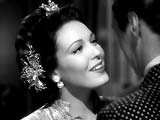 
|
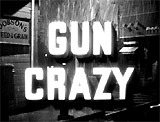
|
This film noirish crime film by director Joseph H. Lewis featured two in-love sharpshooters and petty criminals who eventually married because of their kindred love of weapons:
In their drab, cheap hotel room, during a domestic squabble brewing between the couple after they ran out of money, she emerged from the bathroom behind him, wearing a white, terry-clothed robe (and naked underneath). Annie Laurie was complaining and dis-satisfied with her unexciting life. As he cleaned his gun barrel by thrusting (phallically) a brush within it, she pulled on her nylons and rejected his proposal of a forty-dollars a week job at Remington ("I want to do a little living...it's not 40 bucks a week...If I don't get it one way, I'll get it the other"). She admitted she was "no good. I didn't kid you, did I? Well now you know. Bart, I've been kicked around all my life and from now on, I'm gonna start kicking back." She asked the exasperated Bart: "When are you going to begin to live?" When he suggested hocking his guns to "make another start," she countered first by asserting: "Bart, I want things. A lot of things. Big things. I don't want to be afraid of life or anything else." Then she appealed to his flagging masculinity, telling him that she wanted "a guy with spirit and guts. A guy who can laugh at anything, who'll do anything. A guy who can kick over the traces and win the world for me." When he objected ("Look! I don't wanna look in that mirror and see nothing but a stickup man staring back at me"), she hinted that he couldn't deliver and suggested: "You better kiss me goodbye, Bart, because I won't be here when you get back." She dropped onto the bed and reclined back. Agonizing over what to do (his dangling hand opened and closed at his side), he finally succumbed to her wily, fearless, and ruthless ultimatum. He was goaded to illicitly pursue happiness and acquire "things." The blackmail scene ended with his sexual acquiescence and gratification, his decision to remain, and a close-up of his mouth inching towards hers for a passionate kiss, as the image blurred and blackened. It dissolved into the gunshot blast of a gumball bowl during their first robbery - an orgasmic, erotic/violent beginning of their crime rampage as two gun-toting 'wild animals.' |
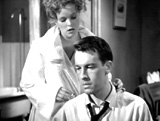   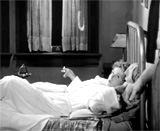  
|
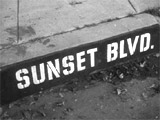
|
Sunset Boulevard (1950) (aka Sunset Blvd.)
Director Billy Wilder's skewering of Hollywood told about a doomed romance between a former screen siren and her kept lover:
While ensnared by the demented Norma who desired a comeback script when he was living in her decaying Beverly Hills mansion on Sunset Boulevard, opportunistic Joe began to have genuine feelings for 22 year-old clean-cut, Paramount script reader Betty Schaefer (Nancy Olson), when they shared work on their own script together. He told her that she was tempting and a "smart girl. Nothing like being twenty-two. And may I suggest that if we're ever to finish this story, you stay at least two feet away from me. Now the first time you see me coming any closer, I want you to take off a shoe and clunk me on the head with it." Their budding relationship was threatening to Norma, and to Betty's fiancee Artie Green (Jack Webb) -- especially when Betty confessed that she was no longer in love with her fiancee:
Earlier in the film, he had playfully but affectionately kissed her on the nose - after she told him that she had a nose job. During a climactic visit by Betty to the mansion, Joe admitted he was a dependent gigolo and 'kept man' under contract who lived off Norma's wealth. Betty was willing to forgive him and leave with him, but Joe stressed his predicament: "I've got a good deal here. A long-term contract with no options. I like it that way. Maybe it's not very admirable." He sadly terminated their relationship by showing her the exit, and encouraging her marriage to Artie. |
 Joe Kissing Betty's Nose 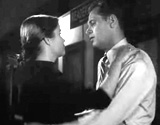  Joe's Brief Love Affair With Betty While Working Together  Joe Saying Goodbye to Betty in Norma's Mansion |

|
Director John Huston's rousing adventure film was also the uncomplicated tale of two companions with mismatched, "opposites attract" personalities who developed an implausible love affair as they traveled together downriver in Africa around the start of World War I, on a ramshackle boat known as The African Queen:
During the course of many hardships and quarrels along a water course filled with tropical dangers and 'evil' Germans in a warship, they developed a hard-earned love and respect for each other. In a memorable scene, they passed by the gun-fortified German fort at Shona - viewed from the perspective of an upward-angled camera. They both ducked down low and prepared to meet the threat together. While being fired upon, the Queen lost power right in front of the fortress making them easy targets when the steam hose disconnected and the pressure dropped. In an exciting sequence, Charlie courageously performed a makeshift repair of the hose while risking exposure to the guns of the fort's guards (both German officers and their African recruits). He was saved from deadly sniper fire when the gunman's gunscope was miraculously blinded by glaring sunlight (and predicted earlier by Rose), and they survived the danger as they passed out of range. At first triumphant after passing unhurt under the guns of the fort, they found themselves rushing directly into a wild, hazardous cataract of rapids. The steam-belching African Queen bobbed through the rapids and rocks as they grasped the rudder and attempted to steer. Wildly relieved and exuberant at miraculously making it through, they embraced and kissed, forgetting themselves entirely. They shouted exultantly:
After their spontaneous embrace and lip-smacking kiss, Charlie loaded fuel into the furnace - his face reflected both skeptical dismay - and then a freeze-frame of pleasurable shock and incredulity. |
    
|
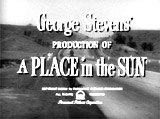
|
Director George Stevens' tragic romantic drama updated Theodore Dreiser's novel An American Tragedy. In one of the most romantic performances ever filmed, in an extended scene of budding romance, this compelling film captured the sensuous and romantic interplay between:
In an electrifying series of images as they danced together and talked intimately with each other, George finally confessed his love to Angela - hers was the promise of the love of an ideal woman which had now been discovered:
Breathlessly, Angela was worried that they were being watched, so they retreated to an outer balcony terrace for more privacy, where she began to confess her love for him in kind: "I love you too. It scares me. But it is a wonderful feeling." They made plans to be together for the entire summer when he wasn't working on weekends, as she told him:
George was overwhelmed during these powerfully-erotic moments. Enormous, extreme closeups of their faces filled the screen as they revealed innermost, heightened emotions and inflamed passions, and they pledged themselves to each other. George confessed: "I'll be the happiest person in the world" - but Angela corrected: "The second happiest." George revealed: "Oh Angela, if only I can tell you how much I love you. I can only tell you all" - and she comforted him: "Tell Mama. Tell Mama all" as they closely embraced and kissed passionately, caught up in an all-consuming relationship over which they had no control. In the final scene, Angela, wearing black (with a white collar), loyally and faithfully visited him in prison just before George's scheduled execution in the electric chair for his part in his pregnant girlfriend's death. She still clung to her deep love for him. Angela promised: "I'll go on loving you for as long as I live." George replied: "Love me for the time I have left. Then, forget me," before they kissed one last time. |
    
|
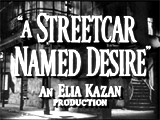
|
Director Elia Kazan's Oscar-acclaimed drama was adapted from Tennessee Williams' play about a former Southern belle who was slowly going mad after arriving at the home of her sister Stella (Kim Hunter) living in New Orleans. As a lonely woman pathologically desperate and yearning for sexual attention, the pitiable Blanche du Bois (Vivien Leigh) was attracted to a young newspaper delivery boy (Wright King) who came to her door one rainy afternoon. He reminded her of her young husband who committed suicide, and still neurotically grieving, she wanted to subconsciously make up for his death. She caused the bashful young man to linger with small talk, and she seductively offered herself for a maternal kiss.
But she caught herself after seductively pressing one kiss into his lips, knowing she had a weakness for young males:
|
  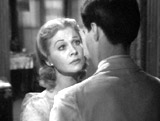 
|
(in chronological order by film title) Introduction | 1896-1925 | 1926-1927 | 1928-1932 | 1933-1936 | 1937-1939 | 1940-1941 1942-1943 | 1944-1946 | 1947-1951 | 1952-1954 | 1955 - 1 | 1955 - 2 | 1956-1958 | 1959-1961 1962-1965 | 1966-1968 | 1969-1971 | 1972-1976 | 1977-1981 | 1982 1983-1984 | 1985-1986 | 1987 | 1988 | 1989-1990 | 1991 | 1992-1993 | 1994 1995 | 1996 | 1997 | 1998 | 1999 | 2000 | 2001 | 2002 | 2003 | 2004 | 2005 | 2006-2007 | 2008 | 2009- |